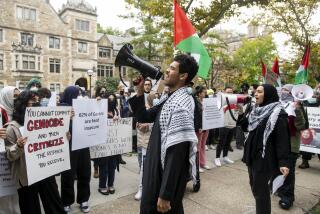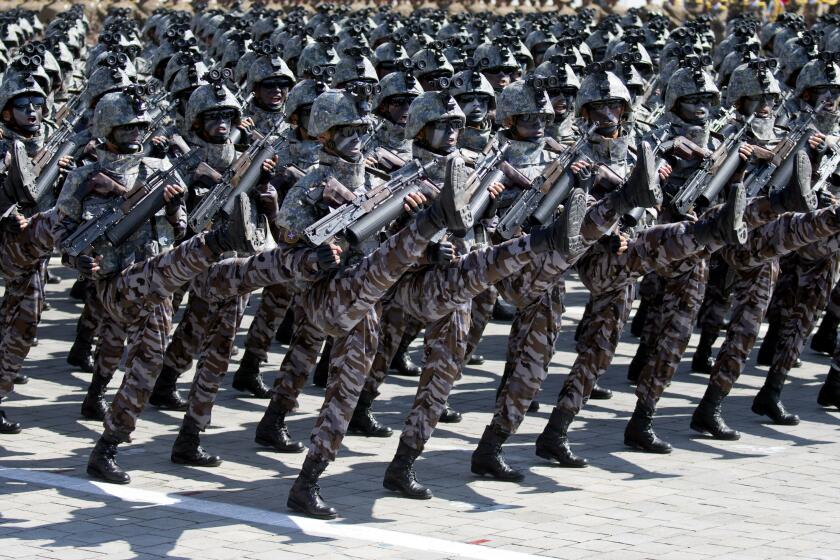9/11 spawned big changes on campus
Reporting from West Lafayette, Ind. — A few weeks ago, 24-year-old Amanda Stirrat completed her master’s degree in public health at Purdue University. Most of her peers struggled to find work. As for Stirrat?
“The job market seemed easy,” she said with a shrug.
She credited her studies in Purdue’s extensive homeland security program for quickly landing her a job to help coordinate Indiana’s response to large-scale public emergencies. Purdue gave her the chance to work with retired military officers and other security specialists to write a thesis on disaster preparedness. The expertise set her apart, she said.
The 2001 terrorist attacks ushered in a major shift on American college campuses — tragedy giving way, 10 years later, to innovation and opportunity.
Today, domestic security has become, by some measures, the fastest-growing area of study, fueled largely by an explosion in federal money. Scores of programs have popped up, from community colleges to graduate schools. Thousands of students across the country are enrolled in courses that didn’t exist a few years ago — delving into the psychology of terrorists and rogue regimes, and here in Indiana, studying emergency response by simulating mass-casualty disasters at the site of the Indianapolis 500.
Entire disciplines that had lost relevance have been resurrected. Some microbiology programs were folding before Sept. 11. Overnight, studying once-obscure germs like anthrax and Ebola became vital; National Institutes of Health funding soared by a factor of 30, and students have been pouring into the field ever since.
Some of the programs have already produced novel advances. At Texas A&M University, federally funded researchers have affixed radiation sensors to cockroaches — on tiny backpacks — that could be deployed to search for a “dirty” bomb.
Thousands of young people now view going to college as being part of “a mission,” said Dr. Tara O’Toole, the Department of Homeland Security’s undersecretary for science and technology. The department has spent nearly $4 billion on scientific research in the last five years, with hundreds of millions more pouring into colleges from other state and federal agencies, including the NIH and the Defense Department.
“This is a generation that is looking for work that is bigger than themselves,” O’Toole said.
The new focus at Purdue is largely the result of its Homeland Security Institute, established after the 2001 attacks to use campus resources to confront national security threats.
The institute has developed courses set in “living laboratories,” such as large dairy operations, to study ways to prepare for, respond to and recover from terrorist attacks. New courses are being added and officials are weighing the possibility of creating a stand-alone homeland security major.
The institute — run by two retired Army lieutenant colonels — also scours announcements of national security initiatives and partners them with campus researchers. The result is a new emphasis on collaboration among the university and government and corporate financiers interested in security research.
Interest in national security “is beginning to influence the way we look at research in general,” said Alan H. Rebar, executive director of Discovery Park, a Purdue think tank that leads interdisciplinary research initiatives. “It invades every area of our research today.”
The investment is paying dividends for the colleges themselves — at a time when they need infusions of cash.
Purdue food scientist Arun K. Bhunia had long been developing nanotechnology to detect naturally occurring pathogens in food. After Sept. 11, Bhunia applied this technology in new ways to guard against terrorism.
10 Years After: Are We Safer?
A key Sept. 11 legacy: more domestic surveillance
Is Homeland Security spending paying off?
The result: a machine that sends lasers through colonies of bacteria, creating a shadow “fingerprint” that could help investigators determine whether a pathogen has been intentionally introduced into the food supply. Recently, a private corporation licensed the technology — a development, brokered in part by the institute, that could be worth millions to Purdue.
Chemistry professor R. Graham Cooks has spent decades perfecting a mass spectrometer, a machine that calculates molecular weight and chemical structure. Before Sept. 11, he used it to analyze the molecular framework of strawberry jam and cacti. He said he felt as if he had a fascinating piece of technology in search of a practical application.
Today, Cooks’ science has never been hotter. He and his students have helped refine a hulking machine that once filled a room into a hand-held device that Purdue is preparing to license. The technology can be used to detect traces of explosives on suitcases and clothing or biological agents sent through the mail. The next generation will fit inside a smart phone.
“Everything is moving faster and faster,” Cooks said.
For decades, American colleges have responded to crisis by recasting their curricula to meet national needs.
In 1957, for instance, much of the country was plunged into hysteria after the Soviet Union launched Sputnik I, the first man-made object to orbit Earth. The United States appeared to be losing the space race, and responded with a billion-dollar research and education initiative.
“It is just the nature of American universities. It is in their DNA,” said Irwin Feller, a professor emeritus of economics at Penn State University who headed a study on the effects of homeland security on higher education.
At a time when 2 million college graduates in the United States are unemployed, numerous fields related to national security are hiring. In 2009, for example, the National Cyber Security Division of the Homeland Security Department nearly tripled its workforce.
One small university in Dallas, Pa., is so confident of its national security program that it offers a job guarantee — if graduates do not have a job in six months or are not accepted into a graduate school, the university will provide a three-month paid internship in the student’s field.
Purdue views its national security work as a “differentiator” for its students — “a way to sell yourself in a tough job environment,” said J. Eric Dietz, director of the university’s Homeland Security Institute.
“What my resume looked like two years ago to what it looks like now — there is no comparison,” said Purdue graduate student Steve Riedel, 40.
Riedel was in the Navy for 11 years; the institute has recruited scores of military veterans to return to college. Riedel has taken three domestic security courses at Purdue and is in the home stretch of a security-related thesis, with an eye toward a job in agricultural security.
“The demand is phenomenal,” he said.
Numerous colleges have started programs to take advantage of the research money flowing in since Sept. 11.
USC operates one of the Homeland Security Department’s 12 university-based research units, known as centers of excellence. The university receives about $3 million each year in federal funding; its researchers investigate a host of terrorism-related issues — predicting the economic impact of an attack’s aftermath, such as port closures or disease epidemics.
In May, UCLA opened a $32-million Global Bio Lab, funded largely by the state and federal governments, to target bioterrorist attacks and infectious diseases.
“A handful of universities have really hit the jackpot,” said Feller, the retired economics professor.
At Kansas State University in Manhattan, Kan., taxpayers will spend nearly a billion dollars to build the National Bio and Agro-Defense Facility to guard the nation’s agricultural economy and food supply. Though it is a federal project, it is expected to have a deep and lasting effect on the university — long before it is operational in 2019.
The facility’s scientists, for instance, will become adjunct KSU professors, enhancing graduate studies and creating new areas of collaborative research. The university is planning to use the project to develop partnerships with animal health corporations.
The Manhattan area could become “a Silicon Valley for food science and animal science,” said the Homeland Security Department’s O’Toole.
There is skepticism in the academic world that the sudden dominance of security programs is a good thing. William Chace, a recent president of Emory University and professor emeritus of English at Stanford University, said the shift risked turning colleges and universities into “servile mechanisms for state or federal interests.”
Chace spoke by telephone from London, where he was conducting a seminar for students studying “Four Quartets,” T.S. Eliot’s poetic treatise on philosophy and spirituality. It is the sort of study, he said, that will surely be pushed aside by the zeal for domestic security programs.
Others, though, argue that colleges are always evolving and that the ascent of one discipline does not necessarily mean the decline of others.
“The demand is going to continue for years to come,” said Penn State President Graham Spanier, who has long called for higher education to play a heightened role in national security. The university offers several certificate and degree programs — along with a homeland security summer camp for middle school and high school students.
“This is a growth area … that I don’t see tapering off,” Spanier said.
More to Read
Sign up for Essential California
The most important California stories and recommendations in your inbox every morning.
You may occasionally receive promotional content from the Los Angeles Times.











